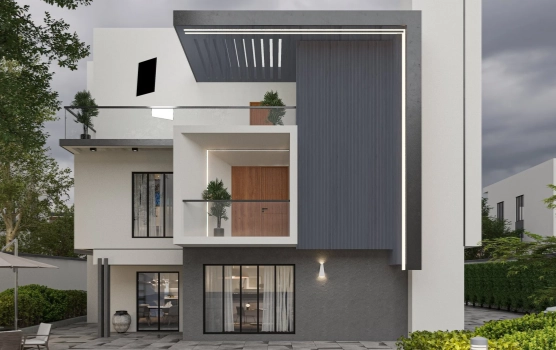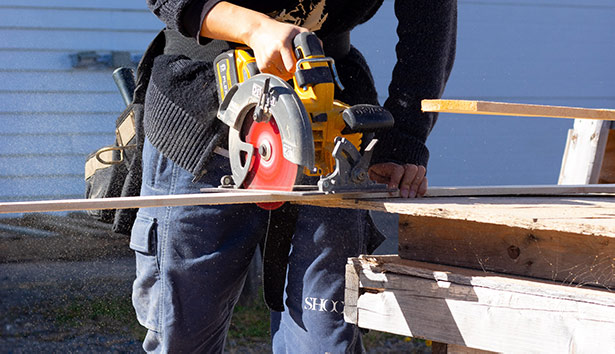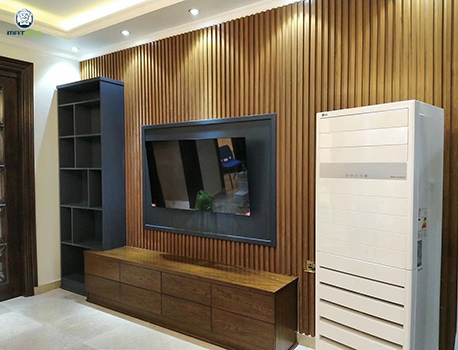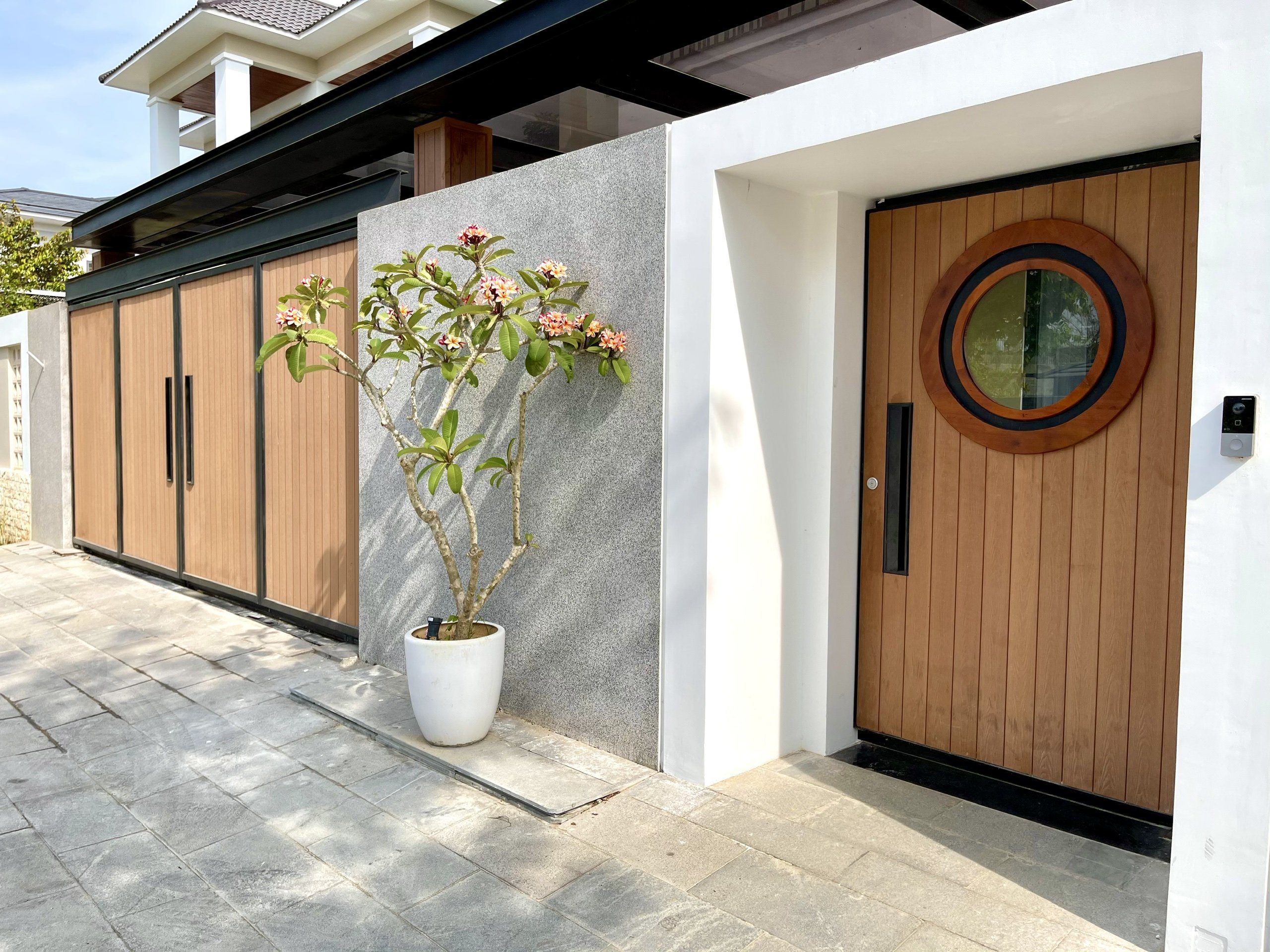Can You Put a Grill On a Composite Deck?
As summer approaches and the aroma of grilled food beckons, many homeowners wonder whether they can enjoy this quintessential outdoor activity on their modern composite decks. Composite decking, a blend of wood fibers and plastics, offers the aesthetic appeal of wood without the high maintenance. However, before you fire up the grill, there are several factors to consider to ensure safety and protect your investment.
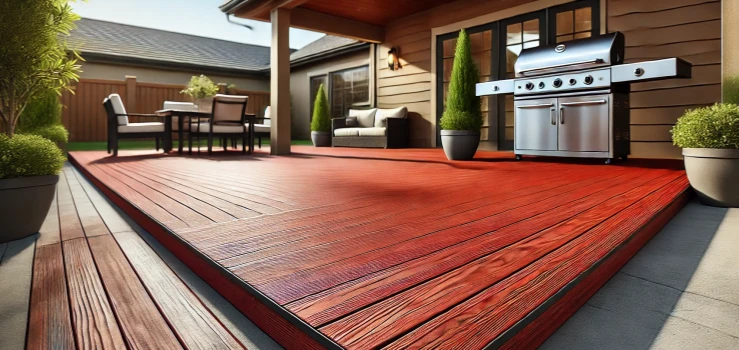
Table of Contents
What is composite decking?
Composite decking is prized for its durability and low maintenance. Unlike traditional wood, it does not warp, splinter, or require frequent staining. However, it is not immune to heat and direct fire exposure. The plastic components can soften or melt at high temperatures, which is a critical consideration when placing a grill on it.
Can the composite decking handle the weight of a grill?
Yes. Composite decks are designed to be durable and sturdy, capable of supporting the weight of most standard grills. These decks are constructed from a blend of wood fibers and plastic, offering enhanced strength and resilience compared to traditional wood decks. The ability of a composite deck to handle the weight of a grill largely depends on the quality of the materials used and the deck's framing. Properly spaced joists and sturdy beams, typically spaced 12 to 16 inches apart, are crucial for ensuring the deck can support heavy loads. High-quality composite decking brands are designed to handle significant weight, but it's always important to check the manufacturer's specifications for weight limits and recommendations.
To ensure the safe placement of a grill on a composite deck, several best practices should be followed. Reinforcing the area where the grill will be placed can provide additional support, especially for larger or heavier grills. Using a heat-resistant grill pad or mat underneath the grill not only protects the deck from heat and grease but also helps distribute the weight more evenly. Avoid placing additional heavy items near the grill to prevent overloading any specific area. Regular inspections of the deck, particularly the area under and around the grill, for signs of wear or damage are essential to maintaining the deck's structural integrity and ensuring safe grilling practices.
Safety Considerations
The primary concern with grilling on any deck is fire safety. Composite materials, while generally resistant to flames, can ignite or melt if exposed to prolonged high heat. Therefore, it's crucial to consider the type of grill and its heat management. Charcoal grills, for instance, tend to produce more direct heat and embers compared to gas grills, posing a higher risk.
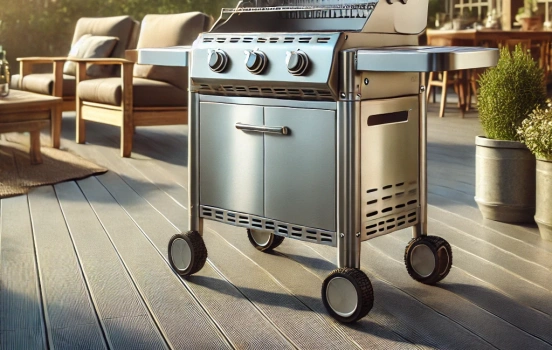
Safety Considerations for Grilling on Composite Decking
1) Choosing the Right Grill
The type of grill you use can significantly impact the safety of your composite decking. Gas grills are often recommended over charcoal grills due to their controlled heat output. Gas grills allow for more precise temperature regulation, reducing the risk of excessive heat damage to the decking surface. They also produce fewer embers, which minimizes the likelihood of stray sparks causing unintended fires.
In contrast, charcoal grills can be more challenging to manage in terms of heat and safety. They tend to produce more direct, intense heat and can emit embers that might fall onto the decking. The ash and soot from charcoal grills can also be problematic, potentially causing discoloration or damage to the composite material if not properly cleaned.
2) Heat Management Strategies
Regardless of the type of grill, employing effective heat management strategies is crucial. Here are several recommendations to ensure safe grilling on a composite decking:
Grill Placement: Position your grill at least two to three feet away from any walls, railings, or other structures. This distance helps prevent heat from accumulating in one area and reduces the risk of fire spreading.
Heat-Resistant Mats: Place a heat-resistant mat or pad under the grill to protect the decking from high temperatures and potential grease spills. These mats are designed to withstand high heat and can act as a barrier between the grill and the composite material.
3) Regular Maintenance:
Keep your grill clean and well-maintained to ensure it operates efficiently. Regularly check for gas leaks if you are using a gas grill and clean out ash and debris from charcoal grills to prevent buildup that could cause higher temperatures.
4) Supervision:
Never leave your grill unattended while in use. Constant supervision allows you to manage any sudden flare-ups or unexpected situations quickly.
5) Fire Extinguisher:
Always have a fire extinguisher or a bucket of sand nearby. In the event of a fire, these can be used to quickly douse flames and prevent them from spreading.
6) Alternative Grilling Options:
If the risks seem too high, consider alternative options like electric grills, which are safer for use on composite decks due to their controlled heat output. Another option is constructing a separate grilling station on a stone or concrete pad adjacent to your deck. This setup allows you to enjoy grilling without risking damage to your decking.
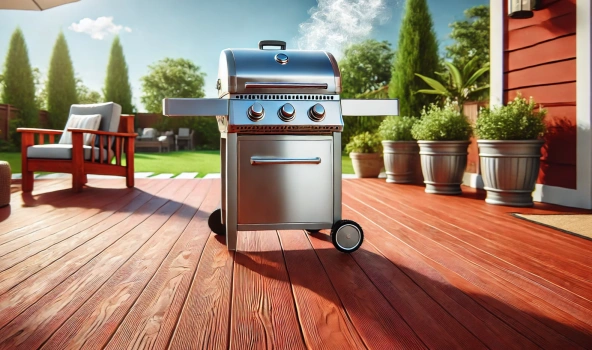
Maintenance and Cleaning Tips
Keeping your deck clean is vital, especially if you grill frequently. Promptly clean up grease and food spills to prevent stains and potential fire hazards. Regular cleaning with appropriate cleaners will also keep your deck looking new and prevent any buildup that could catch fire.
Manufacturer Guidelines and Warranties
Most composite decking manufacturers provide specific guidelines about using grills on their products. Ignoring these guidelines can void your warranty. It's essential to check the manufacturer's recommendations and ensure any grill used is compatible with their safety standards.
Legal and Insurance Perspectives
Before setting up your grill, review any homeowner association rules or local codes to ensure compliance. Some regions have specific regulations regarding grilling on decks, especially in multi-unit residences. Additionally, check with your home insurance provider to understand how grilling on your deck could affect your coverage, particularly if an accident occurs.
Conclusion
Grilling on a composite deck is possible but requires careful consideration of the type of grill, safety measures, and adherence to manufacturer guidelines. By taking the right precautions, you can enjoy many summer barbecues without compromising the safety or integrity of your beautiful composite decking.
If you are looking for a WPC manufacturer, MATECO will be your best choice.
Website: https://www.matecowpc.com
WhatsApp: +86-13380085620
Email: info@matecowpc.com




